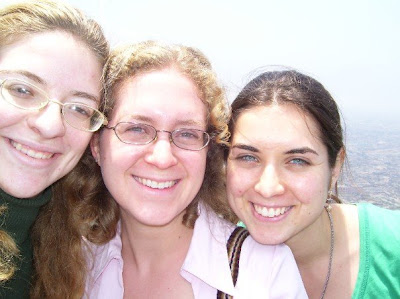
Three gringas seeing the city from Cerro San Cristobal
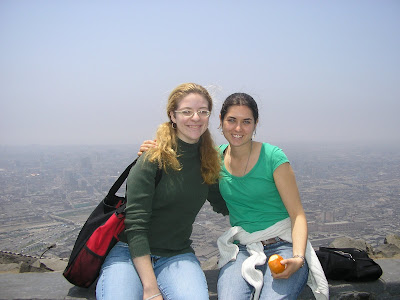 ...and our very decorative lunch.
...and our very decorative lunch.
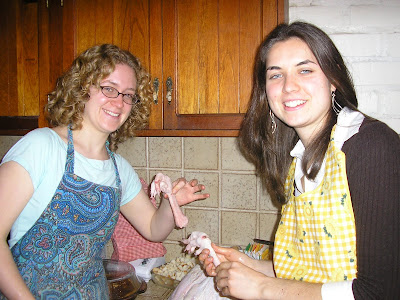 Turkey feet!!!!
Turkey feet!!!! Peruvians discovering Thanksgiving dinner
Peruvians discovering Thanksgiving dinner.jpg) ...and dancing afterwards.
...and dancing afterwards.The Chronicles of A(nother) Volunteer Year in Peru

 ...and our very decorative lunch.
...and our very decorative lunch.
 Turkey feet!!!!
Turkey feet!!!! Peruvians discovering Thanksgiving dinner
Peruvians discovering Thanksgiving dinner.jpg) ...and dancing afterwards.
...and dancing afterwards.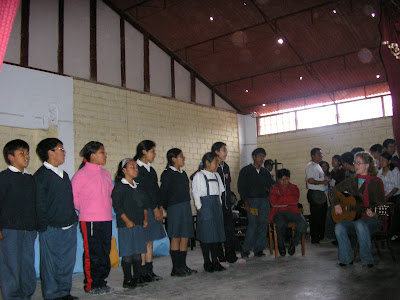

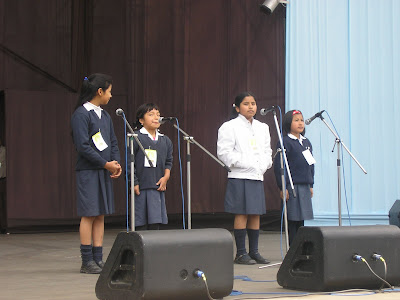


The kids were nervous, especially waiting backstage, but they did really well! It wasn't perfectly tuned and when they split into two parts they messed up a few times but we were all so happy with ourselves that it didn't matter.
In the picture above, from left to right: Rafael on the zampoña, Pedro (a blind kid with a great ear for music) on the guitar, Jacki, me, Claudia, Natali, and Keyssy. Alison didn't show up at the last minute but she and Leslie were there in spirit.


Along with a couple of friends from the parish, I managed to get myself on the committee that organized this event. I'd never seen a real Latin American-style religious procession and I thought it'd be cool to see one from the inside, so to speak. Thanks to several colorful personalities, the organizational meeting was a 2.5-hour argument / complaint session about why things didn't work last year and what the president of the committee had to do about it. (Don't get me started on the Peruvian tendency to back off from committment, or to commit to something and then not show up, but then come back later and angrily criticize the work of the one or two people who have actually take any responsibility for getting whatever it is done.) But I did discover the kinds of things one has to think about in order to have a procession. The whole route has to be marked beforehand, at night, with stops every 100 meters where the carriers will switch off. At these stops the people often gather their religious pictures, rosaries, etc and arrange them on tables with flowers, making a nice sort of image for the anda to stop in front of for prayers and blessings. Sometimes the anda actually makes a little bow to these gatherings of people and items--the carriers in front stoop down and then stand straight again at the sound of the bell, very difficult to do, and everyone applauds. People also take advantage of the stops to bring their babies up to the anda so that the guy in charge can lift the baby up-down-left-right in the sign of the cross in front of the Lord of Miracles. This was funny when the director, Martín, was all stressing out about the time and moving the procession along and they kept passing him baby after baby.
Before the day of the procession you have to put out flyers to all the houses it's going to pass by, so they can be ready. We drafted the church choir to do this one night and the whole group of us ran up and down the neighborhood in the dark, walking in pairs and scurrying quickly past the unlighted sections, slipping papers under people's doors. Then somebody has to think about who's going to carry the thing and have refreshments available for the carriers when they finish; call the band and make sure they will actually show up (the first shift didn't, the second did); invite the mayor, the local functionaries, etc, none of whom actually come; argue with the committee president about why the priest says he can't say a Mass beforehand and yell at him to convince the priest to do so, etc. My job, supposedly, was to sign people up in groups to take turns as carriers. It was complete chaos because I was running around in the crowd looking for people of about the same height and asking them to take a turn, except there was no way I could remember the faces of group after group of twelve strangers dispersed throughout the crowd, much less tell each one when it was their turn, and they didn't all step forward when the lady with the megaphone took a break from the songs and Rosaries to call them. So Martín, the guy running the whole thing, was yelling at me to come up with people to carry and I had no idea where the other five people I'd asked had gone, and we ended up sort of shouting for volunteers each time the anda stopped. I was so stressed and begging my friends to help me, until Eymi told me, Relax, Kata, there's never any carriers. Every year we end up doing this.--It would have been real nice if somebody had told me that before. As usual my expectations were for everything we planned to actually function the way we planned it, thus stressing me out when this did not happen... but the Peruvians knew better. My mistake.
By the time it got dark I'd decided to resign myself to the chaos, ignore Martín's yelling (he's just one of those people who likes to yell), and enjoy the whole plodding, sprawling, noisy, glorious shebang. A few more of my friends showed up and in a spur-of-the-moment decision, once more lacking people to make up the next group of twelve, I jumped in with them to take a turn carrying. Finally I was out from under Martín's yelling and just had to listen for the bell, stand up!--shift the weight, balance it--steady!--and then just think about walking, swaying, right, left, pulling forward and trying to stand straight under the swaying weight of the anda on my shoulder. I was right in front on the same bar as my friends Victor and Alfredo (our girl friends took a turn later but very few Peruvian women are my size, so our group was mixed). It's really, really important for the three people on a bar to be the same height, because if not, the taller person can't stand up under the weight and it's painful for everybody. I think this may have been the case for me because I had a cramp in my back after about 10 minutes, when we switched sides to change shoulders. After my 20 minutes were up I stepped out gladly, feeling almost like I'd been swimming because the exhilerating tiredness of hard exercise was not in my arms or shoulders but in my whole body.

After this experience I was utterly astounded to see that about eight women from the community--all moms in their thirties or forties and all exactly the same height, 5 foot 0--jumped in to carry when a group of shorter people took over towards the end, and didn't leave for the next hour until the anda reached the church again. We kept asking them if they wanted relief and they said, No, no, we do this every year! We're good! Their faces were red and wet with sweat but they were smiling and determined. The groups of tall men in their purple robes had gone long ago, after very chivalrously and self-importantly taking the first four or five turns in a row; now the Lord of Miracles was left with his most fervent devotees, these short, average-looking, amazingly strong women from the pueblo, to carry him on the last long uphill stretch home. And that wasn't all. When they got to the door of the church I thought for sure they'd let the thing drop. But this is Peru: before retiring, the Lord of Miracles has to dance. I couldn't believe what I was seeing. Right at the church door the band suddenly struck up a lively marinera, and I heard my friend Luis say to the carriers, Ok, I don't know how you all are going to do this, but we're gonna make this thing dance!, and the group of carriers started skipping around and turning from side to side so that the image was actually dancing the marinera. I was speechless. All I had energy left for myself was to go get the tray of hot chocolate and rolls for the band when the whole thing was over. (It was the best hot chocolate I have ever had--it tasted like Señora Sofía had put in cinnamon and honey and who knows what else.) One of the band players did a funny little eyebrow-lift thing whenever I looked at him. And that was the procession of the Lord of Miracles.

 Carlos is an amazing visual artist, and I was blown away by the paintings he'd done when they invited us to their house. (Theirs was a pretty decent house--unlike some of the houses farther out from the center of town, it had real walls with drywall on them, concrete floor, a computer in the front room. I didn't see whether it has a back wall or whether the rooms farther in open onto the garden like most of the houses do here.) He also has a motorcycle, and so a few days after my back-of-the-truck experience, I went for my first ride on the back of a moto, hanging onto a guy, no helmet, zipping down the little rural streets with the wind in my face. It was great! In the traffic circle at the edge of town we had to dodge a herd of about 20 sheep. When we rejoined Sister BJ and Maria, we went up to the mirador, a lookout point at the top of the highest hill in town that is crowned with an enormous statue of Jesus. Apparently sometimes you can go up inside Jesus like the Statue of Liberty and look out, but that stairwell was locked, so we just hung out at his feet and looked out over the town as the sun set.
Carlos is an amazing visual artist, and I was blown away by the paintings he'd done when they invited us to their house. (Theirs was a pretty decent house--unlike some of the houses farther out from the center of town, it had real walls with drywall on them, concrete floor, a computer in the front room. I didn't see whether it has a back wall or whether the rooms farther in open onto the garden like most of the houses do here.) He also has a motorcycle, and so a few days after my back-of-the-truck experience, I went for my first ride on the back of a moto, hanging onto a guy, no helmet, zipping down the little rural streets with the wind in my face. It was great! In the traffic circle at the edge of town we had to dodge a herd of about 20 sheep. When we rejoined Sister BJ and Maria, we went up to the mirador, a lookout point at the top of the highest hill in town that is crowned with an enormous statue of Jesus. Apparently sometimes you can go up inside Jesus like the Statue of Liberty and look out, but that stairwell was locked, so we just hung out at his feet and looked out over the town as the sun set.  the beautiful bride and groom
the beautiful bride and groom the cousins, Miriam and Matilde
the cousins, Miriam and Matilde
 me and Sister Lucy
me and Sister Lucy from the mountain near the School Sisters of Notre Dame
from the mountain near the School Sisters of Notre Dame






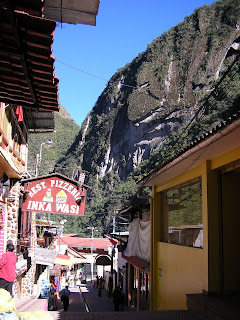 The next morning, instead of feeling better, Chrissy had diarrhea and nausea and didn't want to get out of bed. Our visitors were dropping like flies! We hated to leave her. Would she be better later? Catherine and I took turns going out to get Gatorade and other foodstuffs, and I got to see Aguas Calientes in the early morning.
The next morning, instead of feeling better, Chrissy had diarrhea and nausea and didn't want to get out of bed. Our visitors were dropping like flies! We hated to leave her. Would she be better later? Catherine and I took turns going out to get Gatorade and other foodstuffs, and I got to see Aguas Calientes in the early morning. Finally at 9:30 we had to face the facts. We paid the hostel lady extra to let Chrissy stay in bed during the day, and Catherine and I set out, the only ones still on our feet, to the sacred summit.
Finally at 9:30 we had to face the facts. We paid the hostel lady extra to let Chrissy stay in bed during the day, and Catherine and I set out, the only ones still on our feet, to the sacred summit.The tourism industry around Machu Picchu reminds one of Disney World. It has taken over the city of Cusco and created the town of Aguas Calientes. But once you get up to the ruins, all of that falls behind; you leave it below in the valley. The bus from Aguas Calientes follows the river around the base of a mountain--the mountains go straight up like tapering fingers, practically piled on top of each other, so that it's no wonder nobody got through to discover Machu Picchu for years--and then starts the switchback climb. We watched the river get smaller and smaller below us, and then we were there at the entrance...



We took a walk up toward Inti Punku, the Sun Gate, but I was too tired to make it all the way. On the path we met some llamas and offered them chocolate, which they were not interested in.
Catherine sat down to write a letter to her boyfriend, and I drank in the view.

The ruins were impressive, but I have to say the mountains were more so, and most amazing of all was the light. I felt I had gone from glasses to contacts or gotten an adjustment to my prescription, it was that sharp and brilliant and clear. I thought, whatever the hardships of the people who lived here long ago, they knew nothing of smog or of Lima fog. Their wars and their sacrifices and their sicknesses and feasts were all lived out under infinite skies, always in the presence of majesty and beauty. Up on these mountains, all you have to do is wait and walk, and one after another these amazing sights open up to fulfill you. In Lima I had been so starved for a glimpse of sun and space and beauty, and here was all that beyond anything I had thought of...
We wandered through the ruins, listened in on tours, and tried to pet the llamas frollicking on the lawn. We were only up there for about two hours before I got dehydrated and had to go.

 Incas were short!
Incas were short!
 (The llama and I both blinked.)
(The llama and I both blinked.)
On the way down the mountain, as I drank my Gatorade on the bus, there was a local boy dressed in traditional clothes who ran down the hiking path to wave at the bus at every switchback, yelling a long, singsongy phrase in Quechua. It was charming and all the tourists were looking for him by the end and waving back... but then it turned a little sad when, at the foot of the mountain, he climbed on the bus and called in the same beautiful, high voice, clear as the air of his home-- "Thank you very muuuuuuuuuch! Muchas graaaciaaaaaaaaaas!" and went around collecting tips from the tourists.
...So that was Machu Picchu.
That night we went back to Cusco the same way we came. Tuesday was our last day in Cusco, and it was a day of frustrating decisions because I'd been leaving my mom and sister behind the whole week, and now they didn't want to go on to Arequipa like we planned, because Marissa just needed to get home asap to recuperate. In the end they decided to return to Lima for the two days before their international flight. Catherine wanted to go on to Arequipa, and I chose to go with her mostly because I didn't want her traveling alone, but also because part of me really just needed to leave all the sick people behind and have a few days of vacation not worrying about anyone else. So we got on an overnight bus to Arequipa. Mom and Marissa would have one more day in Cusco in which to go on a tour of the Sacred Valley, which made me feel better because at least they'd have seen something.
But, in keeping with the rest of our vacation, Arequipa did not go as planned either and we ended up spending a total of 15 hours there. It has a very pretty plaza, on which we enjoyed a nice breakfast after our overnight bus ride... very quiet and restful after the stress of Cusco. We saw the cathedral (much simpler than Cusco's but beautiful) and went to Mass, then went back to our hostel and slept. In the afternoon we went to a tourist agency and arranged a tour of nearby Colca Canyon, the deepest canyon in the world. But the tour was not to be. At lunch I started crying because my family was in Peru and I was not with them, and twenty minutes later Catherine was sick to her stomach. So we gave up and changed our bus tickets to return to Lima that night. And I had two days of hanging out in Delicias with Mom and Marissa before taking them back to the airport on Saturday night.
We saw the cathedral (much simpler than Cusco's but beautiful) and went to Mass, then went back to our hostel and slept. In the afternoon we went to a tourist agency and arranged a tour of nearby Colca Canyon, the deepest canyon in the world. But the tour was not to be. At lunch I started crying because my family was in Peru and I was not with them, and twenty minutes later Catherine was sick to her stomach. So we gave up and changed our bus tickets to return to Lima that night. And I had two days of hanging out in Delicias with Mom and Marissa before taking them back to the airport on Saturday night.





